4. Always Striving to Stay True to the Spirit of Zelda
This is a question which I also asked to the younger developers I spoke to last time. What does Zelda mean to you? Let’s begin with you, Kawagoe-san.
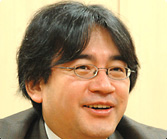
Well, as I was in charge of the cinematic sequences, during development I didn’t know much about how the dungeons and other parts of the game I wasn’t involved in were coming along. Due to this, as the project entered its final stages, I play-tested the game with much the same feeling of excitement as a first-time user would have! (laughs) Just the other day, there was a dungeon where, whatever I tried, I couldn't work out how to get out of it. I was playing with this really serious look on my face, but the second I worked out how to do it, I couldn’t help grinning proudly. I was actually a bit worried that the people around me would notice, but to me Zelda is all about that instant when you grin with satisfaction.
It’s wanting to experience those feelings of satisfaction that gets you playing in the first place.
Precisely. I have a strong feeling that Zelda is the game that pays the most attention to those moments.
You have to come up with a world with that much depth and variety to get the players to enjoy those moments where they think: “I did it!”
That’s right. Speaking from the point of view of the cinematic scene director, one important part of my job is to prepare players for what's ahead by conveying various pieces of information to them. I believe movie sequences are important as they act to reinforce the importance of a particular event and act to focus the player's mind.
Was there anything different about the movie production for Zelda, compared to those for games you have worked on before?
One thing which is very important in Zelda games is minimising the amount of time where the player is simply left watching the screen, unable to press the buttons to influence the action. That is something we have consistently paid a lot of attention to ever since Ocarina.
From the perspective of someone making movie sequences, that must be a pretty tall order!
It certainly is! (laughs) But even in those scenes with long sequences of subtitles which move the story along, we tried to avoid making the player just watch, without being able to control anything. At the very least, we always ensured that the movie sequence wouldn’t carry on until the player had pressed the button to move on to the next message. The idea was that the player should feel they are controlling the game as much as possible. This means that we had to work out what would happen in the movie sequence if the player doesn't press the button, which is no easy task.
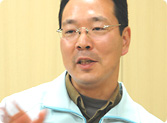
It must be tough thinking of ways to delay the action when the messages aren't being advanced.
But there are ways of doing it. As the series has progressed, we have built up more methods of doing that, more know-how. We want to continue to pay attention to this in the future.
Even just looking at that one aspect of the movie sequences which you paid particular attention to, I feel it connects to the essence of Zelda. Asakawa-san, what do you think makes a Zelda game?
I think it's the feeling that you are actually taking part in the action, that the things in the game are really happening to you. It’s a game where, once you become absorbed in the adventure, you don’t feel like you’re merely controlling the character, but that it’s really you pushing those blocks around. You really feel like you have solved those puzzles in the dungeons. That strange feeling that it’s actually you in the game isn’t confined to puzzle-solving or battles; you get it when you meet and speak to characters in the game, or visit new places. Well, you could sum it up with the word “fantasy”, but that sense of experiencing a world that doesn’t exist is different from the feeling you get watching a film. It all comes down to that feel which is totally unique to Zelda games. This is something which may not be that central to the game, but you also bump into all sorts of oddball characters, the kind that leave you thinking: “No game would normally have someone like that in it!” I think that might also be something you could call “Zelda-esque”.
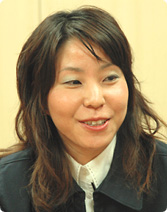
Just look at Tingle. His personality is so out of the ordinary that he has even made a solo debut in his own game. For a character like that to be in a serious game like Zelda… Well, it’s not something you would find in other games…
When we're making Zelda games, we always end up putting a lot of effort into characters like that! (laughs) But because of that, events involving those characters end up leaving more of an impression on the player. There’s a really strong desire among us to make events and characters which get the player thinking: “Well, that was a bit weird, but it was funny! I won’t forget that!” It’s one thing to make something that gets the player saying: “What on earth was that?!” It’s another to have something happen during an event that really hooks the player’s attention and draws them in. To me, that’s “Zelda-esque”. I like those things that are slightly off the beaten track.
Zelda is a serious game, but a lot of thought seems to have gone into those parts that lie “off the beaten track“.
Right. Those parts also make Zelda what it is.
I see. What do you think, Takano-san?
I’m reminded of an expression Shigesato Itoi once used in an article.1 He described something as omotsurai (a combination of the Japanese for fun, omoshiroi, and the word for painful, tsurai). 1 Shigesato Itoi is a famous Japanese copywriter and game designer. A great fan of bass fishing, he lent his name to fishing games released for the Super Nintendo and N64.
Ah, I think he was talking about Bass Fishing!
Yes, it’s something that’s by turns fun then painful, but ultimately enjoyable. When I play Zelda, that’s how I feel. There are moments which are quite painful, but in the end it’s great fun. It’s much the same as making it! There are countless setbacks and challenges that need to be overcome, but when you play the finished version, you really feel a sense of elation. Also, when speaking about the essence of Zelda, I think it's very important that it's not only something the developers are aware of. We also want to get the players to develop a real sense of attachment to Zelda. Because you can say that there are as many Zeldas as there are people playing it, on the development side we often have discussions of whether something is “Zelda-esque” and what exactly that means. We are always seriously grappling with the question of what makes a Zelda game what it is.
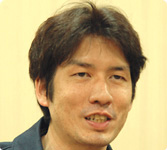
The essence of a Zelda game may not be easily definable in words but it seems there is a certain common understanding of what it is.
I think that's absolutely right. (laughs) During development, you would hear the phrase “that’s just not Zelda-esque" all the time. On occasions, someone would lose their temper and say something like: “Well, then just what is Zelda-esque anyway?” (laughs) As you'd expect, no one could give an answer to that! But whenever someone came up with a good idea, you'd hear things like: "That's it! That's Zelda!" So even though it wasn't clearly defined, we all naturally developed a shared understanding of what makes something "Zelda-esque". It carries on in this way until we have the finished product; it really is quite a mysterious game in that sense. I see. I think that the only thing you can say for sure is that Zelda is not the sort of game where one person came up with everything on their own. Ideas were born after a large number of people laboured over it, and the various elements which were deemed to be “Zelda-esque” acted as a spur to the development of further ideas. I think the game gradually coalesces into something “Zelda-esque” through that process, growing out of the ideas of the people working on it. What do you think, Takizawa-san?
Because of the nature of the work I do, I would say that it is a lot like a miniature Japanese garden. If that garden is designed well enough, then anything that fits into it will by definition be "Zelda-esque”. Taking the garden as the game world, the player's experience will build as they have more and more adventures, and the size of the area they can explore will grow at the same time. If we as developers can stay true to that goal, I think that will mean that anything that you put in that world will be “Zelda-esque”. It is therefore absolutely vital that this “garden” is solidly designed for anything else to be possible.
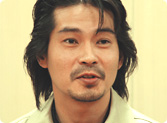
I guess that if you take an overview from the design side of things, you will arrive at that kind of broad conclusion. As far as the design of the game was concerned, was there anything else you paid particular attention to?
For Link’s design, we took a lot of care not to make him look too cool. We thought he should retain a kind of unsophisticated air, a certain lack of style. The reasoning behind that was that in Zelda games, Link has all sorts of expressions and actions which are a long way from the so-called dashing hero. His face when he catches a little fish or his expression when he is really surprised… The fact that the player can move freely throughout the “garden” which is the world of Zelda, is one of the game's major strong points. Because of this, there needs to be a rich variety of facial expressions and actions to go with the range of controls available to the player, otherwise the game won’t ring true. For this reason, Link sometimes performs actions which would be considered strange if he were a “real person”. These actions are something that a dashing, stylish character really couldn’t pull off. So we have designed Link to look cool, but we have done a lot of fine tuning to ensure our aim that he is just cool enough, and no more. For instance, compared to illustrations of Link, the actual character in the game has slightly shorter legs. The legs are only just long enough to give the player that sense of the feel of the ground under their feet when they control Link.
Ah, I see! That's very interesting.
Another really fun “Zelda-esque” detail is the fact that as Link is placed at the heart of the game, all of the enemies and non-player characters in the game, as well as all of the action and events, even the very world around him, all communicate this subtle sense of unsophistication. To achieve that didn’t entail me giving any major directions for that sort of design. When I was checking the design work, I always had a sense of what I wanted in my mind, but I didn’t force that vision on other people. But in spite of this, the various people working on the game’s design all made subtle adjustments to achieve that look that borders on being uncool, ensuring that the atmosphere of the game stayed consistent with the central character. After the experience this time round of developing Zelda, I have come to think that this awareness of the game-world as a whole is what makes the game “Zelda-esque”.
So what you’re saying is that it’s not just limited to design? So perhaps, even though you don’t know precisely what makes the game Zelda-like, the very fact that everyone is always conscious of this is what contributes the most to making the game “Zelda-esque”? Miyanaga-san, what do you think?
As you said, I think the fact that the views of everyone working on the project align to a large extent is what really makes the game “Zelda-esque”. Actually, just the other day, I played the game from the start right through to the end. Coming to the end of the game, what I felt keenly was that the game is very "human". I don't know if "human" is really the right word here, but what I'm trying to express is that the game is not in the least bit dry. For instance, you might solve a puzzle but you don't simply feel: "Ah, so that item and that item used together move that stone slab..." Everything in the game is more human than that. I don't think that's a feeling you can get playing other games.
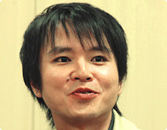
What do you think is it that makes Zelda feel so "human"?
Hmm, I wonder? Just to take one example, think of when you blow up a rock with a bomb. It doesn't feel digital… Er, I'm not really expressing myself very well, but I feel that all of the developers who worked on their own individual part of the game really put their heart and soul into everything they did. Although everything has been tied together into one game so you can't see the join between the different sections, the care that has gone into each one is clear and this really adds a great deal to the game.
Whether you are a developer or player, perhaps every individual can find themselves reflected in this game.
You may be right.
How about you, Ikematsu-san? What is it that makes a game into a Zelda game?
I really don't think I'm going to be able to express it very well, so I think I'll pick out a very specific example. There's a scene in the game where Link breaks into a fortress full of enemies. When I was play-testing that part of the game, I crept into the fortress and the enemies were getting ready to eat a wild boar that they were roasting over an open fire. Just as I was about to shoot at the enemies with the bow I had, I suddenly wondered what would happen if I shot the boar. So I gave it a try, and a heart2 came out of it! 2The heart is an item in Zelda games that replenishes Link's life.
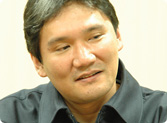
That's certainly a very "Zelda" touch! (laughs)
It is, isn't it? (laughs) When you play the game, you often wonder whether something would happen if you do this or that, and try out various things. And Zelda actually accommodates this!
Right!
Of course, the game hasn't been designed to respond to everything you might attempt to do. But there are those points where you think "I bet there's something here!" and some really nice surprise has been worked into the game. The developers always think of things from the player's viewpoint, and I think they are putting those details in the game with a real insight into what the player might do in a given situation.
I know exactly what you mean! Perhaps that links in to what Miyanaga-san just said about the "human" feel of Zelda. Thank you all very much for sharing your views on that issue. I'd like to move on to the next question now. With regards to the game's design, this may well be the most "Zelda-esque" topic of all! (laughs) I would like to ask about Miyamoto-san and his habit of "upending the tea table."3 3This is a reference to the classic Japanese comic and animated series, Hoshi of the Giants, in which the strict father once upended the tea table when the family was eating their meal there. Shigeru Miyamoto's working style has been compared to this because of his tendency to make last-minute suggestions that leave everyone else scrambling to implement them before the deadline.
(laughter)
Now, I wonder who the best person to start with is?
It may well be Takano-san.
(laughter)
In that case, let's begin with you, Takano-san!
Ok, I'll go first! (laughs) As usual with a Zelda project, the last few months entailed a feverish effort to polish the game, and we got it into really good shape. But at the same time, the contents of the game were being changed to a degree that at times was downright frightening. The story, minor features, everything. And needless to say, it was Miyamoto-san's appearance on the scene which caused all this!
I can imagine! (laughs)
With Twilight Princess, the parts of the game that changed most dramatically were the early stages. Miyamoto-san has always put a lot of emphasis on the importance of the first section of games. Since we were all well aware of this, when we were making the early parts of the game along with Miyanaga-san and his team, we had this funny feeling that whatever we made, it would end up changing anyway! (laughs)
I had the same feeling!
(laughter)
In the case of this game, we of course had to give the player everything they have come to expect from a Zelda game, but on top of that we also had to let them get accustomed to using the Wii Remote. In any case, all of these features were crammed into the start of the game because Miyamoto-san wanted to let the player experience everything they would need early on. Let's just say he wasn't in any mood for compromise.
So what you're saying is that the tea table was upended in spectacular style?
Well, as things turned out, I guess you could say that… Miyamoto-san's "upending" is not simply a matter of him suddenly flipping over the table. On second thoughts, he does do that as well! (laughs) But usually the way he does things, and the start of the Zelda game this time is a particular case in point, is not to completely overturn the whole table. Rather, he takes it in turn to flip all of the dishes and bowls on the table one by one. (Takano gestures as if turning over plates one after the other)
(Roaring laughter)
(While continuing to gesture as if turning over plates) He'll start like this, flipping a cup at the edge of the table, then work his way round before starting on the plates, then the bowls. Then, if he thinks it's necessary, he'll upend the actual table itself. That's why, when you look at the way everything ends up, it looks as if he has just flipped the entire table. But that isn't the case.
So, he doesn't do things the same way as Ittetsu Hoshi?4 (laughs) 4Ittetsu Hoshi was the name of the father in Hoshi of the Giants.
It's not the same. He isn't kicking over the table and saying: "Start again!" (Takano repeats the gesture of turning over plates) No, he's doing this, turning over the plates and bowls saying, change this, and this, and this…
And then before you know it, everything's been changed! (laughs)
Exactly! If you just came in at the end, you'd think he's upended the table in spectacular fashion. But actually, he has put a lot of thought and care into his upending! He really is giving his attention to every detail, from the animation to the fine points of the script. He'll keep going until he decides that there are no more changes to be made and puts the brakes on. Then two hours after he's told that it's all finished, you'll receive an email saying: "I think we should change that line of the script"! And that's in the middle of the night...
So he decides to end it, then decides that after all he'll start it again! (laughs)
It really is incredible to witness. Everyone will be telling him that there is simply no more time left to make changes, and eventually Miyamoto-san will come round to what they're saying and say: "Okay, that's it! All done!" Then you can guarantee that in the middle of the night these e-mails will start appearing, sent to the game designers saying something along the lines of: "I want you to change this. If it's not possible, I'll understand, but..." He's asking if it's possible or not, but he's already been told that it's not possible! In any case, we'll receive any number of e-mails like that, so we'll decide that we have to do it. As this goes on, the staff develop the attitude of waiters and waitresses in a restaurant: "Yes, sir! Right away, sir!"
(Roaring laughter)
But there's no doubt in my mind that because of it, we end up with something that can be called a Zelda game.
But we always get really nervous, especially wondering what he'll spring on us in the last week! (laughs)
Whenever Miyamoto-san comes walking down the corridor, everyone pays attention to where he will turn off, because whatever team is there is about to have something changed! (laughs) The more experienced staff members are aware of this, so when they see him coming in the distance, they always grin and say: "I wonder where he's headed this time?" You see this all the time, and every time you think: "We're really making a Zelda game!" (laughs)
It's also an important part of what defines Zelda! (laughs)
You see it all the time, don't you? (laughs)
All the time! (laughs)
This time around we got a lot of instructions from him by e-mail. After you've been away from your seat for an hour or so and you notice that Miyamoto-san sent you an e-mail while you were away, you're never sure if you really want to open it or not! (laughs)
You get mails so late at night you wonder if he ever actually goes home!
That's right! (laughs)
When the new employees are first exposed to this, it always comes as a shock to them. They come to us and timidly say: "He said that there wouldn't be any more changes, right?" But we haven't got an answer for them, either! (laughs) So we just say something like: "Well, it's difficult to know..."
But with this project, I think that Miyanaga-san was very careful with organising things at the beginning of the project to make sure nothing would be upended by Miyamoto-san. Did he still find something to upend?
Well, let's just say that he's very good at finding the places you haven't given enough attention.
(laughter)
He always points out things that have obviously been overlooked.
Always. You try to predict what he'll notice and take the precaution of implementing something that will pass his inspection, but even then he will spot something that you hadn't considered at all. Regarding the sound or the animation, for example, if something doesn't seem quite right to him, he'll say: "What's this? You haven't finished have you?"
He never misses those really small details.
And it's the small things that make a difference in the end. By just adding that one sound, the entire effect changes. Those are the kinds of results that you can only get from Miyamoto-san.
Did he have much to say about the dungeons?
Yes, quite a bit. He's very aware of what will be difficult for the player to understand or do in the game. He will always point out something along the lines of: "Do you think the player will understand this?" Often, the issues he pointed out were things I was already aware of, but I had to stop working on them because the deadline was approaching. But when Miyamoto-san points something out, it's actually a great help as I can then use that to ask the staff to change it.
(laughter)
So you team leaders are both victims and accomplices at the same time! (laughs)
That's right. Honestly, there are times I want him to come and point something out because then I don't have to say it myself! (laughs)
Takizawa-san, how about the design side of things?
Well, he didn't have much to say at the end of the project, but he did point out one thing to me just before the deadline for the playable demo of Twilight Princess that we showed at E3 in 2005. As far as we were concerned, what he pointed out would never have been a problem in previous Zelda games. What he noticed was that even though we had gone to the trouble of making Link look realistic, we used the same animation for climbing up both ladders and ivy walls. And he was right. We thought it wouldn't be a problem because these two actions used the same animation in all previous Zelda games, but in the end that's not really a good reason to do it that way. So we reviewed the demo for about a week and identified a number of things that made us think: "He'll definitely notice this! We'd better change it or we're in trouble!" In the end, we cleaned it up quite a bit.
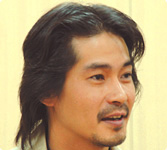
It was that fresh perspective Miyamoto-san gave you that allowed you to notice different things, wasn't it?
It really was. I think you just need to look at it objectively, but when you're the one working on it you never notice those things.
What about with the movies, Kawagoe-san? Did he point anything out to you?
Well, there were a few changes that accompanied the large-scale changes to the opening of the game. For example, we altered some of the movies to subtly refer to the relationships between certain villagers and so on, but there weren't any major changes.
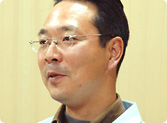
One thing I have always admired about Miyamoto-san is how incredible he is at coming up with ideas that make use of the existing materials when he makes his criticisms. Most people who "upend tables" are more likely to throw everything away, but Miyamoto-san is very aware of how wasteful that is. Even if his suggestion means that something can't be used in the same place anymore, he makes other suggestions about where else it can be used.
That's right. None of the movies were thrown out.
It's another thing about him that doesn't really match the image that is portrayed by the phrase "upending the tea table".
Well, I think that compared to previous Zelda titles, there weren't really any big changes.
There weren't any real fundamental changes, were there?
I'm not saying that it was like the overturning of cups and plates that was mentioned a moment ago, but things were indeed sorted out one by one.
Yes, one at a time. It's like playing Reversi against someone who really knows what they're doing. You think you're winning at first, but before you know what hit you, all the pieces are black.
Before you know what's happening, you haven’t got any pieces left! (laughs)
That's just what it's like! It really is like Reversi! (laughs)
I know! And if someone else only sees the end of the game, they think you were beaten really badly. But what your opponent really did was methodically take each corner, one by one.
What everyone always says about Miyamoto-san is: "First he makes sure that you can't escape, and then he hits you where it really counts!"
(laughter)
When he points something out, you really can't argue as you realise he's absolutely right.
The older developers often say that they basically know what Miyamoto-san will say because they've known him for so long, but to be honest with you, I still don't have a clue!
(laughter)
All right, I would like to move on to my last question. Of all the things you worked on for this project, I would like to hear about your favourite aspect of the game, maybe a part that you put a lot of effort into. Of course it depends on the content, but I would like to include videos for our readers if they can be shown to the public. Let's start with Kawagoe-san.
Well, since I worked on the movies, I don't think there's anything that can be shown…
Well, just tell me what you want to show and let me decide that.
The part that I genuinely like the best is the movie in the latter half of the game where […………].
There is no way we're going to reveal that now!
(laughter)
Well, we've got the equipment all set up here, so let's go ahead and watch the scene. (The movie is shown)
The reason you can hear a horse neighing in the background is because as a developer it was actually a little embarrassing to make such an un-Zelda-like movie, and the neighing of the horse is the expression of the embarrassment we felt in making the movie.
Ah, I see. That's a very nice touch. But…we still can't show it.
I know! (laughs)
Thank you very much. How about you, Asakawa-san?
Well, a lot of things come to mind! (laughs) But I put considerable effort into a particular shop in the game. When the player first goes to this shop, it's a rather exclusive shop that sells only the finest goods. Let me start by showing you that. (The exclusive shop is shown) So that's what it's like at first. In the later stages of the game, if the player clears a certain sub-event, then it becomes like this. (The movie of what happens later starts)
This is…! (laughs) You put everything together for this?
That's right! (laughs)
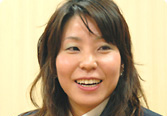
I told her she was overdoing it! (laughs)
I worked on this with Takano-san. It's something we put a huge amount of effort into! (laughs)
Yes, well our collaboration ended up going off in a strange direction.
So, you wanted to do this so badly that you put that much energy into making both shops? (laughs)
That's right.
All those hours you put in must have cost a pretty penny too! (laughs)
Takano-san was really particular about the way this shopkeeper should move. He would actually mimic the movement, saying "Not like that, like this!" (laughs)
What, that movement there? (laughs)
That's the one!
Takano-san also composed the music for it.
You composed the music?
Well, not exactly…
Minegishi-san in the sound section created a musical score of the tune Takano-san hummed to him! (laughs)
That wasn't exactly cheap either, was it? (laughs)
So, can we show the video of this one, too?
……I don't think so.
(laughter)
In that case, I'd like to mention something that we can show. There's a girl in this game called Agitha who loves bugs, and I really like the way she was designed. She's dressed like a little girl, but with a gothic twist, and I think female players will find her appealing. I don't think there's been a character like her in the Zelda series as of yet, and I hope everyone likes her.
I think we can show that to the readers. What would you like to show everyone, Takano-san?
I would like to recommend a place in the game called Hidden Gulch. I really wanted to use the theme of an old Western cowboy film this time around. What's the best way to describe it? The player uses the bow and arrow to take down the enemies that are hiding in the shadows of the buildings, one after the other. Well, it's probably best if you see it for yourselves. (The Hidden Gulch event is shown)
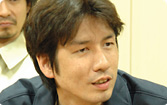
It's just like a Western! (laughs)
You get into it more than you would expect. When I first said I wanted to do a Western everyone just stared at me with blank faces, but once I started working on it with the intention of making it a sub-event, everyone really got on board with the idea.
This is only a sub-event? That's a shame!
Actually, it did make its way into the main storyline… This is also true of the exclusive shop we discussed a moment ago, but I tend to put my efforts into things that aren't part of the main story! (laughs) I think I have a tendency to do that because the other part of my job, which is organising the story, is rather serious business.
Well, I think the fact that you go the extra mile to create events such as this one is part of the essence of Zelda, too! (laughs) Takizawa-san, how about you?
Well, I worked on the lighting of a particular scene and it was a period where I was regularly working right through the night. When I watched the movie after I adjusted the lighting, I was actually moved to tears in spite of myself! (laughs)
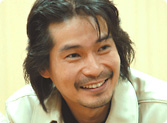
I have a feeling that we won't be able to show this scene to the readers.
Well, it's a scene where [………...].
There's no way we can reveal that here!
I thought as much! (laughs)
We'll just have to ask our readers to look forward to knowing that there's such a heart-wrenching scene waiting for them! (laughs) What about you, Miyanaga-san?
I particularly like the scene where […] wakes up.
[...]? Is [...] in this game?
As one of the dungeon bosses.
……Then that's out of the question, as well.
OK, I've got something to suggest that I'm sure can be shown.
By all means, go ahead! (laughs)
In Twilight Princess, it was possible to put more characters on the screen at the same time than was possible in previous Zelda games. I was so happy about this that I ended up making a lot of scenes like this one. This is a place in one of the dungeons where there are a lot of enemies. (Sample gameplay is shown)
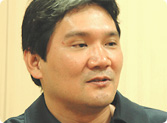
There are a lot of them, aren’t there? Oh, wow, look at that!
And here, too.
Definitely.
And not only are there a lot of enemies, but they can be taken care of all at once, like this.
Ahh, I see. Zelda games are fun for the people who are watching, too. It's interesting just watching someone else play, isn't it?
It is. Oh, this part is a little gross. An insect-like enemy is squirming around here…
Oh! (laughs)
It might not have been in the best taste! (laughs)
No, I think those kinds of things are perfectly fine. You might say that Zelda is the type of game that allows for these things, that it caters to a wide range of tastes.
Something I really like along those lines is Ooccoo.
Yes, Ooccoo! I just love her, too!
Ooccoo? Who's that?
"Put simply, she's basically just a warp item that lets you temporarily leave dungeons, but she's been made into a character who is visually…striking. (Sample gameplay is shown)"
There she is, Ooccoo, sticking her face out of the jar.
Oh! (laughs)
I was actually a little shocked when I saw the design for this! (laughs)
The basis for this design was a doodle that one of the illustrators, Nakano-san, drew during a meeting.
……A doodle?
Then we had this exchange where Nakano-san said to me: "Take a look at what I came up with." I had a look and said: "…Let's go with it!"
The instant he saw it, it was a done deal! (laughs)
…OK, thank you all very much.
Oh, and Ooccoo has a son!
OK! That's enough for today!
(laughter)
…By the way, why is she called Ooccoo?
It's kind of a mystery.
……
……
Well, I'm sure that the exchange we just had is also a part of the essence of Zelda!
(laughter)
Thank you all for your time today.
Thank you very much!
